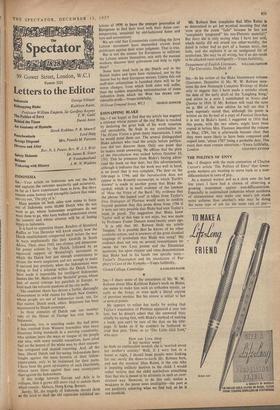Letters to the Editor
Kidnapping Blake Kathleen Raine, Indonesia George Edinger
Professor William Empson, Sir Geoffrey Keynes
The Politics of Envy T. W. Gadd Behind the Times David Astor.
An Anatomy of Hysteria
Derek Robbins, P. R. Mursell
Paeechendaefe Lord Haig Sewage Disposal Mrs. Pamela M. Parsons 1/leoree and After Rev. N. S. Power, Rev. W. I. S. Weir Safety Helmets ' Dr. James K. Slater
'tritons F. Younghusband
Tinkering with History J. W. N. Watkins SIR,—Your article on Indonesia sets out the facts and explains the outcome succinctly and accurately, so far as I have experienced them in Java. But there remain some human and intangible factors that make one cry out, The pity of it.'
Mass passion on both sides now seems to force out of Indonesia some 60,000 Dutch who do not want to go, whose Indonesian neighbours do not want them to go, who have walked unmolested about the country and whose absence will be of lasting injury to Indonesia. It is hard to apportion blame. Readers of Stamford Ruffles or Van Deventer will know exactly how the Dutch establishment comported itself before the war in ways unpleasantly like their kinsfolk in South Africa. Then, since 1945, two clumsy and unsuccess- ful police actions by the Dutch, followed by an equivocal support of Westerling's movement to which the Dutch lent just enough countenance to arouse the worst suspicions and not enough to make it succeed just precisely when the Indonesians were trying to find a solution within the Dutch Union, have made it impossible for intelligent Indonesian leaders like Mr. Hatta and the 'Socialist' group, whose lack of moral courage has parallels in Europe, to hold back the volcanic passions of the city mobs.
The resultant chaos has driven a feeble, distraught Government to wild claims for Dutch New Guinea, whose people are not of Indonesian stock, nor, for that matter, Dutch stock, either. Bitterness has been accentuated by Dutch contempt. In three centuries of Dutch rule one membpr only of the House of Orange has ever been in Indonesia.
Indonesia, too, is smarting under the bad press it has received from Western journalists who exact luxurious living standards in a starving community, who seldom learn the ways or tongue of the people and who, with some notable exceptions, have piled fuel on the hatred of the white man by their manner- less arrogance and slanted reporting. And, all the time, liberal Dutch and far-seeing Indonesians have fought against the mass hysteria of their fellow- countrymen, only to be victimised for their pains. I have been the guest up-country of such Dutchmen, always more bitter against their own countrymen than against the Indonesians.
If this bridge between Europe and Asia is to collapse, then it grows still more vital to sustain those which remain : Malaya, Hong Kong, Borneo.
Surely, Sir, the tragedy of Indonesia should show us the need to shed the old expatriate inhibited iso- lations of 1939, to leave the younger generation of Europeans to find their level with their Asian con- temporaries, untainted by old-fashioned hates and bars and conventions.
We are told that Communists controlling the Java Labour movement have stampeded craven local politicians against their wiser judgment. That is true. But is not the answer for Europeans to infiltrate the Labour unions themselves, mix with the manual workers, discover their grievances and help to right them?
Some have tried both in the Dutch and in the British Indies and have been victimised, not by the Asians but by their European seniors. Unless this old stuff-shirt colonialism is banished there will be far worse changes, from which both sides will suffer, than the sudden impending nationalisation of some industries from which the West has drawn con- siderable profit.—Yours faithfully,
14 Great Ormond Street, WC/ GEORGE EDINGER






































 Previous page
Previous page